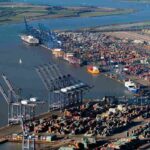The UK government promised that freeports and Special Economic Zones (SEZs) would transform struggling regions. These free zones, often near ports or airports, give businesses tax breaks for 10 years and deregulatory frameworks rules to draw them in.
The pitch was simple: thousands of good jobs, thriving communities, and a boost for places like Teesside, the Thames, and Scotland’s Firth of Forth. They called it “levelling up” – a lifeline for left behind towns. But the reality is starkly different. New data shows freeports and SEZs aren’t delivering. They’re falling short on jobs and costing taxpayers billions.
Let’s break down what’s really happening with these so-called economic game-changers.
Jobs promises fall flat at Freeports
The government set high hopes for freeports and SEZs. They launched 12 freeports – eight in England, two in Scotland, two in Wales – and 74 SEZs across the UK. Freeports alone were supposed to create 80,000 jobs, with SEZs adding even more over time. But the numbers tell a different story.
According to government data I examined, the 12 freeports have created just 5,600 jobs so far. Here’s the catch: two-thirds of those – 3,733 jobs – aren’t new. They’ve just been moved from other parts of the UK, a problem called “job displacement.” A 2011 Work Foundation report found that 66% of freeport jobs and 80% of SEZ jobs are displaced, not created. That leaves only 1,867 genuinely new jobs from freeports.
SEZs aren’t doing much better. They’ve created 100,000 jobs since 2012, but with that 80% displacement rate, only 20,200 are truly new. Add it up, and freeports and SEZs have delivered 22,067 new jobs by 2024 – far below the government’s targets. A 2024 House of Commons report shows freeports missed their job goals by 77% to 96%.
The regional picture no better
The regional picture is bleak too. A table shared on X, labeled “Comparison Summary,” highlights the shortfalls in job creation for freeports, showing a 77% shortfall in Scotland (promised 8,000 jobs, delivered 1,857) and a 92% shortfall in England (promised 53,333 jobs, delivered 4,124). For SEZs, the shortfalls were even worse, with England seeing a 92% gap (promised 240,000 jobs, delivered 20,000).
Chart 1 data, also shared on X, provides a detailed snapshot of 2024 job creation for both freeports and SEZs, breaking down the genuinely new jobs after displacement:

England’s eight freeports created 1,244 new jobs, Scotland and Wales got 311 each, and Northern Ireland – just one SEZ, no freeports – managed 200. This isn’t a new story. Thatcher tried freeports in the 1980s, Cameron in the 2010s. Both failed because businesses shifted jobs to grab tax breaks, not to create new ones. History keeps repeating itself.
A huge cost for taxpayers
Now let’s talk money: your money. By 2024, the government had spent £19.78bn on freeports and SEZs.
Freeports took £2.5bn, including £1bn in seed funding and £1.5bn in tax breaks from 2022 to 2024. SEZs cost £17.28bn since 2012 – £12bn up to 2020, £4bn from 2020 to 2024, and £1.28bn more for Investment Zones in the 2023 Spring Budget. Divide that £19.78bn by the 22,067 new jobs, and each job costs £896,246. That’s nearly £900,000 per job.
The regional costs are just as stark:
- England: £13.03bn for 16,244 jobs, or £802,149 per job.
- Scotland: £4.68bn for 3,911 jobs, or £1,196,624 per job.
- Wales: £2.08bn for 1,711 jobs, or £1,215,661 per job.
- Northern Ireland: £0.237bn for 200 jobs, or £1,185,000 per job.
Looking ahead, the government plans to spend £64bn by 2046-2048, aiming for 68,334 new jobs. That’s £9.5bn more for freeports, including £6bn in tax breaks, and £54.5bn for SEZs, with £30.72bn for Investment Zones.
Chart 2, shared on X, provides the 25-year projections for these schemes, revealing the cost per job and the scale of job displacement:

Freeports are for fattening corporate profits
Even if they hit that target, each job will cost £936,693 (you read that correctly), that’s more than 26 times the UK median salary of £34,963. The high displacement rates-ranging from 77% to 96% for freeports and 80% to 92% for SEZs – mean most of the promised jobs aren’t new. Over 25 years, the total promised jobs across the UK are 919,519 (adjusted based on regional displacement rates), but 711,163 are displaced. Breaking this down for England, Scotland, and Wales:
- England: Of 564,688 total promised jobs (222,225 from freeports, 342,463 from SEZs), 519,513 are displaced – 92% of the total.
- Scotland: Of 70,692 total promised jobs (19,322 from freeports, 51,370 from SEZs), 55,974 are displaced—79% of the total.
- Wales: Of 141,831 total promised jobs (111,100 from freeports, 30,731 from SEZs), 133,392 are displaced—94% of the total.
To highlight the scale of this issue, Chart 3 summarizes the displaced jobs over the 25-year period:

That’s a lot of money for so little return. It could have gone to schools, hospitals, or communities, but instead, it’s fattening corporate profits.
Where that £19.78 billion could have gone
Imagine what £19.78bn could do for ordinary people.
If the government paid workers the UK median salary of £34,963, that money could have supported 565,723 people for a year. Or it could have funded 113,145 workers every year for five years: jobs like teaching or nursing that help communities thrive.
Instead, freeports and SEZs gave us 22,067 jobs. Direct payments would have helped 5 to 25 times more people. Over 25 years, the planned £64bn could support 1,830,210 workers for a year – or 366,042 every year for five years. That’s 5 to 26 times more than the 68,334 jobs they hope for by 2048.
It’s not just about jobs. This money could have made a real difference for struggling families. Instead, it has gone to big corporations like BlackRock, who bought 80% of shares in three major UK freeports: Harwich, Thamesport, and Felixstowe.
Reminder: BlackRock first and foremost cares about its shareholders. Local workers are an afterthought. Meanwhile, families face higher council tax, energy bills, and food costs as councils struggle to make ends meet.
Think about the real issues this money could have tackled. Disability benefit cuts are hitting hard. In March 2025, Department for Work and Pensions (DWP) secretary Liz Kendall announced cuts to benefits like Personal Independence Payment (PIP). The Scottish government called them “devastating for disabled people”.
Thomas Lawson from Turn2us warned they “will harm more people than they help”. The cuts aim to save £5bn a year by 2030, but they’re crushing vulnerable people, especially in Wales, where areas like Blaenau Gwent and Merthyr Tydfil have high health-related claims. That £19.78 billion could have protected these people, giving them support instead of hardship.
£19.78bn towards scrapping the two child benefit cap anyone?
Chancellor Rachel Reeves fiscal illiteracy is another big problem. In 2024, she found a £22bn “black hole” in public finances, a Tory mess. But instead of investing in people, she’s stuck on piling up MORE austerity. Her “fiscal lock” policy lets the Office for Budget Responsibility (OBR) control spending, and critics say it blocks vital investment in public services. Reeves’ focus on balancing the books hurts the poorest while billions go to freeports. That £19.78bn could have filled that £22bn gap, sparing us more cuts.
Labour obstinately kept the two-child benefit cap, a 2017 Tory policy that stops parents claiming benefits for a third child. Keir Starmer refused to scrap it in 2023, blaming “tough decisions” on money. Labour says they’ll remove it “when fiscal conditions allow,” but there’s no timeline. Families are struggling now. That £19.78bn could have ditched the cap, lifting kids out of poverty and helping parents provide for their families.
Kids are losing out in other ways. Cash-strapped councils are closing sports grounds and selling school playing fields. In 2024, the Guardian reported state schools were losing sports facilities – fields sold, pools closed, while students at top private schools have 10 times more green space than state pupils. Poor kids suffer most, losing chances to stay active and healthy. That £19.78bn could have saved these spaces, giving every child a fair shot.
£19.78bn for public sector pay rises
Workers are feeling the pinch too. In Birmingham, refuse workers have been on strike since March 2025, fighting council cuts to their waste service. Unite claims it means £8,000-a-year pay cuts for some – a huge blow with living costs soaring. The council says only 17 workers are affected and offered other roles, but the workers rejected it as “totally inadequate.” Rubbish piles up, rats are spreading, and locals are fed up. That £19.78bn could have settled this, paid workers fairly, and kept the city clean.
The NHS needs help too. In April 2025, ministers were told there’s “no extra money” for pay rises for NHS staff and teachers in England. Nurses, after years of pay cuts and a staffing crisis, are stretched thin. They’ve faced pandemics and underfunding, but their wages don’t match inflation. That £19.78bn could have given them a decent pay rise – keeping staff, lifting morale, and supporting the NHS.
Then there’s the water crisis. Privatised water firms are raising bills to fix old sewage systems. Ofwat is investigating “breathtakingly high” costs compared to other countries. Professor Paul Jeffrey from Cranfield Water Science Institute says privatisation means firms don’t prioritise value: they pass costs to consumers.
Sewage spills into rivers and seas, threatening health, but bills keep rising. Some firms even asked the Competition and Markets Authority to let them charge more. That £19.78bn could have funded public upgrades, cleaned our rivers, and maybe renationalised water: putting people first.
This £19.78bn could have helped disabled people, kids, families, workers, and communities. Instead, it has gone to freeports and SEZs, where corporations benefit, while families struggle with higher bills and fewer services.
Who’s really winning? Not workers
Dig deeper, and it’s clear: freeports and SEZs are set up to help big business, not workers. The tax breaks, lax rules, and public cash are all about attracting corporations. But the benefits don’t reach ordinary people.
Look at BlackRock: a massive investment firm. They’ve bought 80% of shares in three major UK freeports, (Felixstowe, Thamesport, and Harwich) positioning themselves to cash in. Blackrock’s sole focus is on their shareholders, not workers in those regions.
This isn’t just a UK issue. Globally, freeports and SEZs often benefit the rich while leaving locals with little. They’re linked to tax evasion, money laundering, and even worker exploitation, as firms exploit lax rules. In the UK, leaving the EU made this worse. The EU has strict rules against “state aid” – public money propping up private firms – but the UK loosened these after Brexit. Now corporations can milk these zones, often at workers’ expense.
X user Mary Whitby called it “socialism for corporates, conmen, and billionaires”, not working people. The government claims it’s “rewarding working people”, but these schemes funnel public money to corporations, not communities. Workers face higher council tax, energy bills, and food prices, while the promised jobs barely show up.
A failed idea that keeps coming back
This isn’t the first time the UK has tried freeports and SEZs. History shows they don’t work. In the 1980s, Margaret Thatcher launched freeports and enterprise zones, promising to revive struggling areas. By 2012, they were scrapped: job displacement was high, and the benefits were tiny. David Cameron tried again in the 2010s, but he shut them down by 2012 after the same failures.
So why are we back here? It’s not just Tory politics – it’s Labour too. Rishi Sunak and Liz Truss pushed freeports hard, but Keir Starmer’s Labour Party signed off on them every step of the way. Labour MPs, mayors, councillors, lords, and baronesses sat on cross-party freeports and SEZs boards, rubber-stamping these corporate zones alongside Sunak and Truss.
Metro mayor Steve Rotheram has been a big player in this, leading the charge for the Liverpool City Region Freeport. Rotheram worked closely with the Tory government to secure the Freeport in the 2021 Budget, collaborating with Sunak, and later Truss, to roll out this part of the nationwide free zones plan. He’s on the Liverpool Strategic Futures Advisory Panel with Tory Michael Gove, shaping the Freeport’s future, according to the Liverpool City Region Combined Authority.
Labour mayors working hand-in-hand with Tory governments
Rotheram boasts about projects like the Parkside site in St Helens, claiming it’ll create 500 jobs with a £100m investment, and says the Freeport will bring “thousands” more jobs, plus “green jobs” for net-zero goals. But there’s no word on displacement. The data shows 66% of freeport jobs aren’t new, just moved. Are Rotheram’s numbers any better?
It’s the same story with Manchester Mayor Andy Burnham, a potential future prime minister, who has embraced the Greater Manchester Investment Zone. Burnham secured this zone in the 2023 Spring Budget, working hand-in-hand with Sunak’s Tory government to funnel £160m in public funds over 10 years into advanced manufacturing, promising 32,000 jobs and £1.5bn in private investment, according to the Greater Manchester Combined Authority.
But those job figures don’t account for displacement either, which could mean most aren’t new, just like the 66%-80% displacement rates we’ve seen elsewhere. The Forth Green Freeport board, chaired by Labour’s Dame Susan Rice, had Labour councillors like Alan Nimmo cosying up to business leaders too.
Carving up the UK in corporate enclaves
This is Labour continuing the Tories’ nationwide carve-up of the UK into corporate enclaves: corporate sovereignties where big business calls the shots. Freeports and SEZs hand corporations tax breaks and lax rules, turning public land into private profit zones while workers get nothing. Labour’s complicity shows they’re not offering change: they’re doubling down on the same failed Tory playbook.
Burnham’s track record raises more red flags. He claims Manchester’s investment funds have created 7,700 to 16,000 jobs since 2014, but there’s no word on how many are genuinely new.
And his Clean Air Zone fiasco – where £104.5m of public money was spent on a scheme that never launched – shows state aid doesn’t always deliver. Burnham says the money was repurposed for buses and cameras, but air quality stayed illegal, and pollution even rose in some areas, according to Manchester Evening News reports.
If Burnham becomes prime minister, will he double down on these corporate zones nationwide? Rotheram is on the same path. His Freeport promises sound big, but without displacement data, they’re just more empty talk.
Techno-populism: Labour aligning with big business
It’s no accident Labour’s on board. Morgan McSweeney, Starmer’s key strategist, has been expunging the left from Labour, purging anyone who might push back on this corporate agenda. McSweeney’s mission is clear: shift Starmer’s Labour further right, aligning it with big business over working people.
Sunak said in 2016 that leaving the EU would let the UK create “ambitious” freeports, free from EU rules, according to an LSE blog on British politics. But Labour’s support – Burnham and Rotheram included – proves this isn’t about Brexit. It’s a bipartisan sellout to corporate interests.
There’s a techno-populist angle too.
Figures like Ben Houchen, Tees Valley mayor, sold these schemes as a way to “take back control” and empower locals, as the LSE blog noted. Labour mayors like Rotheram and Burnham echoed the same rhetoric, with Rotheram pushing “green jobs” and Burnham touting a “Northern Arc” to boost the North. But the real winners are corporations, not communities. This gap between promises and reality is classic techno-populism: big talk, little substance.
Time to rethink Freeports and SEZs
The UK’s freeports and SEZs are a broken promise. They’ve cost taxpayers £19.78bn for just 22,067 new jobs – that’s £896,246 each – and missed job targets by up to 96%. Over the next 25 years, that cost could hit £936,693 per job, with £64bn (you read that correctly!) poured into schemes that mostly benefit big business.
Meanwhile, that £64bn could have supported 1,830,210 workers directly, putting money back into families and communities who need it.
These schemes were meant to “level up” the UK, but they’re doing the opposite: hitting workers with higher taxes and living costs while firms like BlackRock profit.
It’s time for a rethink. If we want jobs and stronger communities, we need policies that put people first, not corporate profits. The data doesn’t lie: freeports and SEZs aren’t the answer. Let’s invest in workers, fair wages, and growth that benefits everyone, not just the elite.
Featured image via Wikimedia



















